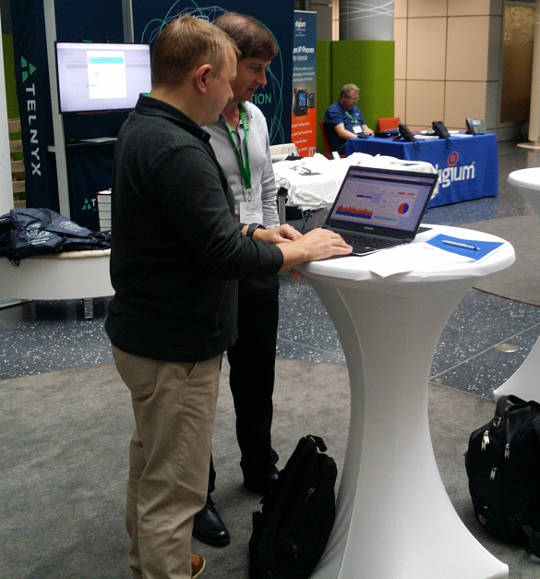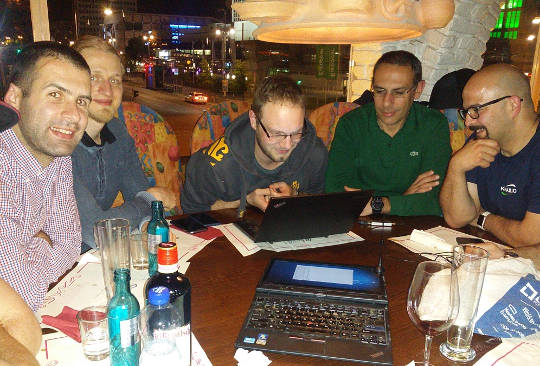
Previously:
v5.6
Linux v5.7 was released at the end of May. Here s my summary of various security things that caught my attention:
arm64 kernel pointer authentication
While the ARMv8.3 CPU Pointer Authentication (PAC) feature
landed for userspace already, Kristina Martsenko has now
landed PAC support in kernel mode. The current implementation uses
PACIASP which protects the saved stack pointer, similar to the existing
CONFIG_STACKPROTECTOR feature, only faster. This also paves the way to sign and check pointers stored in the heap, as a way to defeat function pointer overwrites in those memory regions too. Since the behavior is different from the traditional stack protector, Amit Daniel Kachhap added an
LKDTM test for PAC as well.
BPF LSM
The kernel s Linux Security Module (LSM) API provide a way to write security modules that have traditionally implemented various Mandatory Access Control (MAC) systems like SELinux, AppArmor, etc. The LSM hooks are numerous and no one LSM uses them all, as some hooks are much more specialized (like those used by IMA, Yama, LoadPin, etc). There was not, however, any way to externally attach to these hooks (not even through a regular loadable kernel module) nor build fully dynamic security policy, until KP Singh landed the API for
building LSM policy using BPF. With this, it is possible (for a privileged process) to write kernel LSM hooks in BPF, allowing for totally custom security policy (and reporting).
execve() deadlock refactoring
There have been a number of long-standing races in the kernel s process launching code where ptrace could deadlock. Fixing these has been attempted several times over the last many years, but Eric W. Biederman and Ernd Edlinger decided to dive in, and successfully landed the a series of refactorings,
splitting up the problematic locking and refactoring their uses to
remove the deadlocks. While he was at it, Eric also
extended the exec_id counter to 64 bits to avoid the possibility of the counter wrapping and allowing an attacker to send arbitrary signals to processes they normally shouldn t be able to.
slub freelist obfuscation improvements
After Silvio Cesare observed some weaknesses in the implementation of
CONFIG_SLAB_FREELIST_HARDENED s freelist pointer content obfuscation, I
improved their bit diffusion, which makes attacks require significantly more memory content exposures to defeat the obfuscation. As part of the conversation, Vitaly Nikolenko pointed out that the freelist pointer s location made it relatively easy to target too (for either disclosures or overwrites), so I
moved it away from the edge of the slab, making it harder to reach through small-sized overflows (which usually target the freelist pointer). As it turns out, there were a few assumptions in the kernel about the location of the freelist pointer, which had to also get
cleaned up.
RISCV page table dumping
Following v5.6 s
generic page table dumping work, Zong Li landed the
RISCV page dumping code. This means it s much easier to examine the kernel s page table layout when running a debug kernel (built with
PTDUMP_DEBUGFS), visible in
/sys/kernel/debug/kernel_page_tables.
array index bounds checking
This is a pretty large area of work that touches a lot of overlapping elements (and history) in the Linux kernel. The short version is: C is bad at noticing when it uses an array index beyond the bounds of the declared array, and we need to fix that. For example, don t do this:
int foo[5];
...
foo[8] = bar;
The long version gets complicated by the evolution of
flexible array structure members, so we ll pause for a moment and skim the surface of this topic. While things like
CONFIG_FORTIFY_SOURCE try to catch these kinds of cases in the
memcpy() and
strcpy() family of functions, it doesn t catch it in open-coded array indexing, as seen in the code above. GCC has a warning (
-Warray-bounds) for these cases, but it was
disabled by Linus because of all the false positives seen due to fake flexible array members. Before flexible arrays were standardized, GNU C supported zero sized array members. And before that, C code would use a 1-element array. These were all designed so that some structure could be the header in front of some data blob that could be addressable through the last structure member:
/* 1-element array */
struct foo
...
char contents[1];
;
/* GNU C extension: 0-element array */
struct foo
...
char contents[0];
;
/* C standard: flexible array */
struct foo
...
char contents[];
;
instance = kmalloc(sizeof(struct foo) + content_size);
Converting all the zero- and one-element array members to flexible arrays is one of Gustavo A. R. Silva s goals, and
hundreds of these changes started landing. Once fixed,
-Warray-bounds can be re-enabled. Much more detail can be found in the kernel s
deprecation docs.
However, that will only catch the visible at compile time cases. For runtime checking, the Undefined Behavior Sanitizer has an option for adding runtime array bounds checking for catching things like this where the compiler cannot perform a static analysis of the index values:
int foo[5];
...
for (i = 0; i < some_argument; i++)
...
foo[i] = bar;
...
It was, however, not separate (via kernel Kconfig) until Elena Petrova and I
split it out into CONFIG_UBSAN_BOUNDS, which is fast enough for production kernel use. With this enabled, it's now possible to instrument the kernel to catch these conditions, which seem to come up with some regularity in Wi-Fi and Bluetooth drivers for some reason. Since UBSAN (and the other Sanitizers) only
WARN() by default, system owners need to set
panic_on_warn=1 too if they want to defend against attacks targeting these kinds of flaws. Because of this, and to avoid bloating the kernel image with all the warning messages, I
introduced CONFIG_UBSAN_TRAP which effectively turns these conditions into a
BUG() without needing additional sysctl settings.
Fixing "additive"
snprintf() usage
A common idiom in C for building up strings is to use
sprintf()'s return value to increment a pointer into a string, and build a string with more
sprintf() calls:
/* safe if strlen(foo) + 1 < sizeof(string) */
wrote = sprintf(string, "Foo: %s\n", foo);
/* overflows if strlen(foo) + strlen(bar) > sizeof(string) */
wrote += sprintf(string + wrote, "Bar: %s\n", bar);
/* writing way beyond the end of "string" now ... */
wrote += sprintf(string + wrote, "Baz: %s\n", baz);
The risk is that if these calls eventually walk off the end of the
string buffer, it will start writing into other memory and create some bad situations. Switching these to
snprintf() does not, however, make anything safer, since
snprintf() returns how much it would have written:
/* safe, assuming available <= sizeof(string), and for this example
* assume strlen(foo) < sizeof(string) */
wrote = snprintf(string, available, "Foo: %s\n", foo);
/* if (strlen(bar) > available - wrote), this is still safe since the
* write into "string" will be truncated, but now "wrote" has been
* incremented by how much snprintf() *would* have written, so "wrote"
* is now larger than "available". */
wrote += snprintf(string + wrote, available - wrote, "Bar: %s\n", bar);
/* string + wrote is beyond the end of string, and availabe - wrote wraps
* around to a giant positive value, making the write effectively
* unbounded. */
wrote += snprintf(string + wrote, available - wrote, "Baz: %s\n", baz);
So while the first overflowing call would be safe, the next one would be targeting beyond the end of the array and the size calculation will have wrapped around to a giant limit. Replacing this idiom with
scnprintf() solves the issue because it only reports what was actually written. To this end, Takashi Iwai has been
landing a bunch scnprintf() fixes.
That's it for now! Let me know if there is anything else you think I should mention here. Next up: Linux v5.8.
2020, Kees Cook. This work is licensed under a Creative Commons Attribution-ShareAlike 4.0 License.

 As it is now known, the freenode IRC network has been taken over by a Trumpian wannabe korean royalty bitcoins millionaire. To make a long story short, the former freenode head of staff secretly "sold" the network to this person even if it was not hers to sell, and our lawyers have advised us that there is not much that we can do about it without some of us risking financial ruin. Fuck you Christel, lilo's life work did not deserve this.
What you knew as freenode after 12:00 UTC of May 19 will be managed by different people.
As I have no desire to volunteer under the new regime, this marks the end of my involvement with freenode. It had started in 1999 when I encouraged the good parts of
As it is now known, the freenode IRC network has been taken over by a Trumpian wannabe korean royalty bitcoins millionaire. To make a long story short, the former freenode head of staff secretly "sold" the network to this person even if it was not hers to sell, and our lawyers have advised us that there is not much that we can do about it without some of us risking financial ruin. Fuck you Christel, lilo's life work did not deserve this.
What you knew as freenode after 12:00 UTC of May 19 will be managed by different people.
As I have no desire to volunteer under the new regime, this marks the end of my involvement with freenode. It had started in 1999 when I encouraged the good parts of  The following contributors got their Debian Developer accounts in the last two months:
The following contributors got their Debian Developer accounts in the last two months:
 As a reader of
As a reader of  I have been a Puppet user for a couple of years now, first at work, and
eventually for my personal servers and computers. Although it can have a steep
learning curve, I find Puppet both nimble and very powerful. I also prefer it
to Ansible for its speed and the agent-server model it uses.
Sadly, Puppet Labs hasn't been the most supportive upstream and tends to move
pretty fast. Major versions rarely last for a whole Debian Stable release and
the upstream
I have been a Puppet user for a couple of years now, first at work, and
eventually for my personal servers and computers. Although it can have a steep
learning curve, I find Puppet both nimble and very powerful. I also prefer it
to Ansible for its speed and the agent-server model it uses.
Sadly, Puppet Labs hasn't been the most supportive upstream and tends to move
pretty fast. Major versions rarely last for a whole Debian Stable release and
the upstream  Previously:
Previously: 
 Debian
devscripts
Before deciding to take an
Debian
devscripts
Before deciding to take an  I ve had a kludgy mess of electronic address books for most of two decades,
and have got rather fed up with it. My stack consisted of:
I ve had a kludgy mess of electronic address books for most of two decades,
and have got rather fed up with it. My stack consisted of:
 Welcome to gambaru.de. Here is my monthly report that covers what I have been doing for Debian. If you re interested in Java, Games and LTS topics, this might be interesting for you.
Debian Games
Welcome to gambaru.de. Here is my monthly report that covers what I have been doing for Debian. If you re interested in Java, Games and LTS topics, this might be interesting for you.
Debian Games

 Visiting the FSFE team in Berlin
Having recently joined the FSFE's General Assembly as the
Visiting the FSFE team in Berlin
Having recently joined the FSFE's General Assembly as the  Steak and SDR night
After a hard day of SIP hacking and a long afternoon at Kamailio World's open bar, a developer needs a decent meal and something previously unseen to hack on. A group of us settled at Escados, Alexanderplatz where my SDR kit emerged from my bag and other Debian users
Steak and SDR night
After a hard day of SIP hacking and a long afternoon at Kamailio World's open bar, a developer needs a decent meal and something previously unseen to hack on. A group of us settled at Escados, Alexanderplatz where my SDR kit emerged from my bag and other Debian users  Next stop OSCAL'17, Tirana
Having left Berlin, I'm now in Tirana, Albania where I'll give an SDR workshop and Free-RTC talk at
Next stop OSCAL'17, Tirana
Having left Berlin, I'm now in Tirana, Albania where I'll give an SDR workshop and Free-RTC talk at 
 Here is my monthly update covering what I have been doing in the free software world (
Here is my monthly update covering what I have been doing in the free software world (

 To add to the above, it is still cheaper than air travel, although that is changing a bit as Indian Railways seeks to modernize Railways and make it into world-class bullet trains.
Indian Railways has a long, rich culture and some of the most interesting nuggets you learn over time adds to the fascination of the Railways. For instance I m sharing this letter which I read first in book and then saw in the New Delhi Railway Museum. The letter I am sharing below was written by a certain Shri Okhil Chandra Sen to the Sahibganj Railway Office in year 1909, almost 38 years before India became independent.
I am arrive by passenger train Ahmedpur station and my belly is too much swelling with jackfruit. I am therefore went to privy. Just I doing the nuisance that guard making whistle blow for train to go off and I am running with lotah in one hand and dhoti in the next when I am fall over and expose all my shocking to man and female women on plateform. I am got leaved at Ahmedpur station.
This too much bad, if passenger go to make dung that dam guard not wait train five minutes for him. I am therefore pray your honour to make big fine on that guard for public sake. Otherwise I am making big report! to papers.
If it were not for Mr. Okhil Chandra Sen we would still be running with water bottle (improvement) and jeans/shorts/whatever (again improvement) while the possibility of falling over would always be omnipresent in a hurry. Now we do have toilets and some of the better trains even have
To add to the above, it is still cheaper than air travel, although that is changing a bit as Indian Railways seeks to modernize Railways and make it into world-class bullet trains.
Indian Railways has a long, rich culture and some of the most interesting nuggets you learn over time adds to the fascination of the Railways. For instance I m sharing this letter which I read first in book and then saw in the New Delhi Railway Museum. The letter I am sharing below was written by a certain Shri Okhil Chandra Sen to the Sahibganj Railway Office in year 1909, almost 38 years before India became independent.
I am arrive by passenger train Ahmedpur station and my belly is too much swelling with jackfruit. I am therefore went to privy. Just I doing the nuisance that guard making whistle blow for train to go off and I am running with lotah in one hand and dhoti in the next when I am fall over and expose all my shocking to man and female women on plateform. I am got leaved at Ahmedpur station.
This too much bad, if passenger go to make dung that dam guard not wait train five minutes for him. I am therefore pray your honour to make big fine on that guard for public sake. Otherwise I am making big report! to papers.
If it were not for Mr. Okhil Chandra Sen we would still be running with water bottle (improvement) and jeans/shorts/whatever (again improvement) while the possibility of falling over would always be omnipresent in a hurry. Now we do have toilets and some of the better trains even have 

